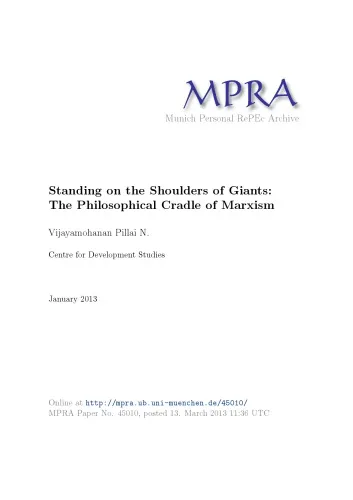Standing on the Shoulders of giants The Philosophical Cradle of Marxism
4.5
Reviews from our users

You Can Ask your questions from this book's AI after Login
Each download or ask from book AI costs 2 points. To earn more free points, please visit the Points Guide Page and complete some valuable actions.Introduction to "Standing on the Shoulders of Giants: The Philosophical Cradle of Marxism"
"Standing on the Shoulders of Giants: The Philosophical Cradle of Marxism" offers a profound exploration into the intellectual and philosophical roots of Marxism. The title itself alludes to the idea that Karl Marx and Friedrich Engels did not develop their revolutionary theories in isolation but rather built upon the works of brilliant minds who preceded and influenced them. Designed for both scholars and enthusiasts alike, this book meticulously charts the historical and philosophical lineage that shaped the materialist conception of history and dialectical analysis that define Marxism.
In this book, I delve deeply into the legacy of great thinkers from ancient Greece, the Enlightenment, German Idealism, and British political economy, outlining the contributions of figures such as Heraclitus, Hegel, and Feuerbach. The text unpacks complex ideas and traces how these concepts found expression in Marxist theory, laying the groundwork for one of the most transformative philosophies in human history. Anchored in rigorous research and written with an accessible yet analytical tone, this book aims to educate and inspire readers to understand Marxism not just as a political ideology but as a rich intellectual tradition with profound implications for understanding society, economics, and history.
Through a structured analysis, the book seeks to demonstrate that Marxism is best appreciated as a synthesis of historical materialism and dialectics, both deeply rooted in the broader philosophical debates of their time. It is an invitation to stand, metaphorically, on the shoulders of these intellectual "giants" to grasp the essence and evolution of ideas that transformed the world.
Detailed Summary of the Book
This book is divided into multiple chapters, each focusing on different foundational aspects of Marxism and the thinkers who influenced its development.
In the early chapters, I begin by exploring pre-Socratic philosophers like Heraclitus, who introduced the dialectical method—the idea of constant change and contradiction in nature. These ideas form the bedrock of dialectical reasoning, a crucial element in Marxist philosophy. The book then moves to Enlightenment thinkers and German Idealists, such as Kant and, notably, Hegel. Hegel’s dialectical method—analyzing progress through contradictions—provided a structural framework that Karl Marx famously inverted by emphasizing material conditions over ideas.
As the narrative progresses, I trace the influence of Ludwig Feuerbach’s materialist theories and critique of idealism, which set the stage for Marx’s rejection of Hegelian mysticism. Feuerbach’s emphasis on humanistic and materialist perspectives laid the groundwork for Marx’s own materialist conception of history. Additionally, the philosophical foundations are coupled with an analysis of British political economists like Adam Smith and David Ricardo, whose labor theory of value informed Marx's critique of capitalism.
The latter chapters focus on the culmination of these influences in the collaborative works of Marx and Engels, particularly their ability to synthesize these disparate sources into a coherent framework. The concluding sections of the book reflect on the ongoing relevance of these ideas in contemporary society and the enduring legacy of Marxism as both a philosophical and practical tool for social change.
Key Takeaways
- Marxism is built upon the intellectual contributions of philosophers, economists, and historians spanning centuries.
- The dialectical method, rooted in ancient philosophy, was central to Marxist theory and social analysis.
- Karl Marx and Friedrich Engels synthesized insights from German Idealism, British political economy, and French socialism to develop their revolutionary ideas.
- Understanding the history of ideas enriches our comprehension of Marxism as both an academic discipline and a practical philosophy.
- Marxism remains a relevant framework for critiquing and addressing contemporary socioeconomic issues.
Famous Quotes from the Book
"Marxism was not born in isolation; it is a towering structure built upon the foundations laid by the greatest thinkers of human civilization."
"In standing on the shoulders of giants, Marx and Engels were able to see not just further, but more clearly, identifying the material contradictions that drive history forward."
"Dialectical thinking teaches us that change is not only inevitable but also shaped by the contradictions inherent in every system."
Why This Book Matters
At a time when Marxism is often misunderstood or misrepresented, "Standing on the Shoulders of Giants" serves as a vital resource for anyone looking to engage deeply with its philosophical roots. This book bridges the gap between historical scholarship and contemporary relevance, offering readers the opportunity to explore the intellectual underpinnings of a theory that continues to influence political movements, academic discourse, and societal debates. By understanding the "giants" who paved the way for Marx and Engels, readers can develop a nuanced and informed appreciation of Marxism as a nuanced and systematic philosophy, not just a political tool.
For students, activists, and researchers, this book provides a contextual framework—and intellectual grounding—necessary for engaging with Marxist theory in meaningful ways. It underscores the importance of philosophy in shaping worldviews that lead to transformative change in society. Ultimately, it reaffirms that the study of Marxism is not just about the past but also about its potential to illuminate the present and guide us toward a more just and equitable future.
Free Direct Download
You Can Download this book after Login
Accessing books through legal platforms and public libraries not only supports the rights of authors and publishers but also contributes to the sustainability of reading culture. Before downloading, please take a moment to consider these options.
Find this book on other platforms:
WorldCat helps you find books in libraries worldwide.
See ratings, reviews, and discussions on Goodreads.
Find and buy rare or used books on AbeBooks.
1163
بازدید4.5
امتیاز50
نظر98%
رضایتReviews:
4.5
Based on 0 users review
"کیفیت چاپ عالی بود، خیلی راضیام"


